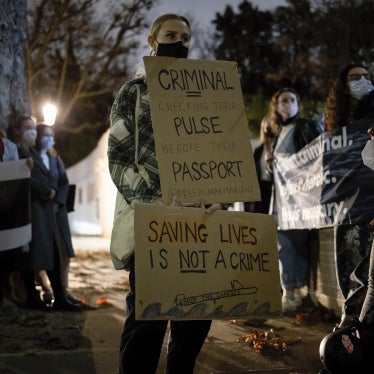Over the last decade nativist populists across the European Union have grabbed headlines . But the cost of that political attention has been less focus paid to how their ideas have entered the mainstream, as establishment parties, left and right, across the European Union have adopted anti-rights, populist positions.
Take two examples from recent weeks.
In an “earthquake” in Germany’s Thuringia state earlier this month, the leader of the Free Democrats came to power with the support of the far-right Alternative for Germany (AfD) and somelocal center-right Christian Democratic Union (CDU) politicians, the first time in Germany’s post-war history that a mainstream party has relied on the support of the far-right party to form a regional government. There is deep concern that it is another step toward normalizing the politics of the far-right in Germany, even if the government was short-lived. The decision by Thuringia’s local CDU politicians to vote with the AfD has had serious repercussions for the future of the Chancellorship once Angela Merkel steps down.
In January’s regional elections Matteo Salvini’s Lega-led coalition did less well in wealthy Emilia-Romagna’s regional elections than polls predicted, but still recorded a historic high in a stronghold of the political left. Meanwhile, a Lega-supported center-right coalition did come to power in Calabria, Italy’s poorest region.
Either one of these electoral results seems to lead to introspection or debate about whether populism has succeeded in entering power or been staved off for the time being. But much of this is a distraction.
In the meantime, several mainstream parties have embraced nativist, populism-inspired anti-rights policies and rhetoric on welfare and migration. And they can show the same disdain for courts, critical media, vibrant civil society, and other independent checks on executive power.
While the normalization of populist politics in Europe is often discussed, the precise impact the corrosive ideas of nativist populists has on people’s thinking is less well documented. It can be seen in recent changes to welfare policies, with lines drawn dividing the deserving and the undeserving poor.
Welfare
European Union countries’ national welfare systems, a key postwar human rights success, are a manifestation of people’s right to an adequate standard of living and social security, with rights protections sometimes written into law. This is now under attack, with recent efforts by center-right and center-left governments to scale back social security programs based on welfare chauvinism, the idea that the state’s welfare safety net is only for those who truly “belong.”
Austria’s ÖVP-FPÖ coalition (in place until last June) cut welfare spending for non-Austrians, introducing residence and language hurdles. The European Commission and neighboring EU states, whose citizens were affected in large numbers, challenged the policies. The future of these measures is to be seen under the new ÖVP-Green government, but the tone has been set.
In Denmark, as part of their winning effort to pursue or “bring back” working class citizens from voting for populists, the Social Democrats’ strategy involved an “ours first” welfare stance alongside an anti-immigration agenda. The three leftist parties on whose support the Social Democrat minority government relies may be a small brake, but nativism has become well embedded in Danish political thinking.
Integration
The pernicious influence of nativist populism is also evident in policies around integration in many parts of Europe, putting equality and nondiscrimination standards at risk.
The Netherlands exemplifies how establishment parties adopt xenophobic policies to pursue votes they think might otherwise go to the radical right. Prime Minister Mark Rutte’s 2017 open letter to migrants, telling them to “act normal or leave” the country, sounded an election dog whistle. A key plank of the nativist agenda is to place “acting normal” or “being Dutch” in direct opposition to visible manifestations of Muslim belief. Anti-Muslim policies pioneered by the murdered politician Pim Fortuyn, later by the radical right populist Geert Wilders, and in its most recent “alt-right” guise offered by Thierry Baudet have become mainstream.
Since August, the Netherlands has had a law banning full-face coverings, including the niqab and burqa. Such laws disproportionately impact Muslim women and can hinder their access to critical services without addressing concerns regarding whether some women are being forced to wear a veil. The Dutch ban faces challenges in implementation, with some city authorities and transport operators saying it was impracticable. But women who wear the full-face veil report being blocked from entering playgrounds and public transport. Although veil and headscarf bans can in some places result from aggressive secularism rather than nativist populism, recent trends show a strong overlap between dress-code bans and far-right concerns about the “Islamicization” of Europe.
Denmark’s previous center-right Liberal (Venstre) government also introduced a ban on the full face veil, but went a step further in institutionalizing xenophobic and anti-Muslim sentiment with a package of measures to force the integration of people living in neighborhoods officially designated as “ghettoes,” based on levels of social problems and a foreign-born population. The measures range from compulsory enrollment in child care for “ghetto children” to doubled sentences for crimes and enforced demolition or sell-offs of public housing.
Denmark’s current Social Democrat minority government, which supported all but one of the proposals while in opposition, continues to implement the so-called “ghetto deal”. While the current government’s move away from labeling these zones “ghettoes”, and softening its position on social housing demolition are worth noting, the other problematic, discriminatory measures remain. These measures risk alienating and stigmatizing, rather than integrating, people in affected communities.
Independent Courts
Europe also needs to be watchful about the normalization of attacks on democratic institutions by the executive. We know from Poland and Hungary that undermining judicial independence is a preferred tactic by populist governments, removing obstacles to executive action at the expense of the rule of law. Judges from across Europe have made clear the risk of contagion, and European Union institutions have rightly responded. Populist governments in these countries have also taken aim at independent activists advocating for the rights of people left vulnerable as a result of government policy, or independent media offering critical reportage.
In that context, the warning signs of the UK mainstream center-right government embracing similar ideas on the judiciary are plain to see. In the last quarter of 2019, under Prime Minister Boris Johnson, the ruling Conservative party threatened to ignore a binding Supreme Court ruling that struck down its suspension of parliament, with voices in the party calling for abolishing the court. Johnson’s decision over the new attorney general in last week’s cabinet reshuffle, and a recent report that, according to government insiders, his top aide wants to “get the judges sorted” are worrying indeed. The government’s promised constitutional review that will look at the scope of judicial review could seek to curtail the key role of the courts to hold power in check.
These developments may seem disparate, and indeed the last one is from a country which has just left the European Union. But they are signals of what happens when establishment parties pander to misplaced fears and insecurities in pursuit of votes, giving further credence to those fears and undermining the structures that protect rights. They demonstrate the need for a major effort across Europe over the decade we have just entered to ensure that mainstream parties do not pursue ersatz versions of populism at the expense of human rights, democratic institutions and the rule of law.
Kartik Raj is a Western Europe researcher at Human Rights Watch.










